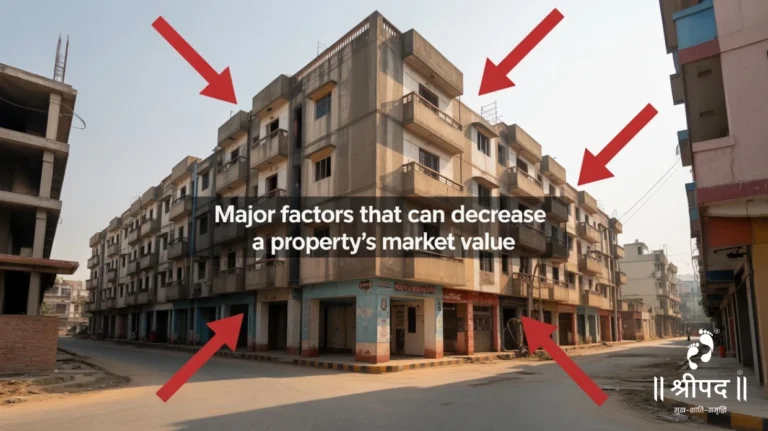- SHREEPAD GROUP
-
+91 83476 68000

Real estate investment can be extremely lucrative, but the success of any investment largely depends on choosing the right location. The old adage “location, location, location” remains true—properties in the wrong location can lead to disappointing returns, no matter how promising they seem. Many investors make critical errors during this stage, often overlooking key factors that affect property value, rental potential, and long-term growth. Understanding the importance of location in real estate investments is essential to avoid these pitfalls. In this article, we’ll examine the most common mistakes investors make when selecting a location and provide guidance on how to avoid them.
Ignoring Future Development Plans
A frequent misstep among investors is focusing on the current appeal of a neighborhood without considering its long-term development trajectory. An area may seem quiet and affordable today, but upcoming infrastructure projects or commercial expansions can either boost or reduce property value significantly.
Tips to Avoid This Mistake:
- Review the city’s master plan and any upcoming infrastructure projects.
- Connect with local authorities or urban planning offices.
- Consult real estate experts familiar with future growth areas.
Neglecting to consider the long-term development plan can result in missed opportunities or investing in areas that may lose appeal over time.
Underestimating Connectivity and Infrastructure
Many investors overlook how essential connectivity and infrastructure are for property value. Properties far from transport hubs, highways, or airports might be inexpensive initially, but they are often harder to rent or sell.
What to Consider:
- Distance to major roads, metro stations, and bus routes.
- Accessibility to hospitals, schools, shopping centers, and other facilities.
- Upcoming transport projects that could improve connectivity.
Convenience drives demand. Well-connected properties usually maintain higher value and attract quality tenants.
Prioritizing Price Over Potential
Buying a property solely because it’s cheap is a common mistake. Low-cost areas might seem attractive initially, but they often come with hidden challenges like poor infrastructure, safety concerns, or limited appreciation potential.
Better Approach:
- Evaluate cost against expected returns rather than the initial price.
- Consider neighborhood quality, safety, and growth prospects.
- Look at potential rental income and long-term appreciation.
An expensive property in a prime location often provides higher returns over time compared to a low-cost property in a declining area.
Neglecting Demographic Insights
Understanding the demographics of an area is crucial. A neighborhood dominated by retirees may not appeal to young professionals, while areas with many families may prioritize schools and parks.
Demographic Factors to Examine:
- Age distribution and lifestyle trends.
- Employment centers and key industries nearby.
- Population growth and migration patterns.
Ignoring demographics can result in properties that are difficult to rent or sell, impacting your investment returns.
Disregarding Market Trends
Real estate markets are constantly changing, and failing to study trends is a major error. Some investors jump into a neighborhood because it’s “popular” now, only to find the market has peaked or is experiencing a temporary bubble.
How to Stay Ahead:
- Analyze historical price trends.
- Monitor demand for rentals vs. sales in the area.
- Study economic factors that influence real estate growth.
Data-driven decisions, rather than emotional ones, often lead to the best investment outcomes.
Overlooking Legal and Regulatory Issues
Legal complications can derail an investment if overlooked. Many investors fail to check zoning regulations, property titles, or pending litigation before purchasing, which can lead to costly problems later.
How to Protect Yourself:
- Verify ownership and property titles.
- Understand zoning and land-use restrictions.
- Comply with local tax and housing regulations.
A simple legal oversight can turn a promising property into a financial burden, making due diligence essential.
Ignoring Environmental Risks
Environmental factors are often underestimated but can significantly impact property value. Properties in flood-prone areas, regions with poor air quality, or areas prone to natural disasters may be cheaper but come with high risks.
Key Considerations:
- Flood zones, drainage issues, and water availability.
- Pollution and overall environmental quality.
- History of natural disasters and disaster preparedness.
Considering environmental factors ensures a safer investment and attracts tenants who value safety and sustainability.
Overlooking Local Amenities
Neighborhood amenities significantly influence property attractiveness. Areas lacking schools, hospitals, or shopping options tend to have slower appreciation and lower rental demand.
Amenities to Evaluate:
- Educational institutions and healthcare facilities.
- Shopping complexes, entertainment options, and restaurants.
- Parks, recreational spaces, and community centers.
Properties with nearby amenities are more appealing to buyers and tenants, ensuring steady demand and growth.
Falling for Hype
Every city has “hot” neighborhoods that gain sudden popularity. Investors often rush to invest based on hype, leading to overpaying for properties without evaluating the actual long-term potential.
How to Avoid Hype:
- Conduct thorough research instead of relying on marketing claims.
- Seek multiple perspectives, including local real estate agents.
- Compare price growth trends with similar neighborhoods.
Investing based on facts rather than trends ensures better returns and reduces risk.
Skipping Professional Guidance
Many new investors attempt to navigate the real estate market alone. While self-research is valuable, professionals offer insights that can save time, money, and prevent costly mistakes.
Who Can Help:
- Local real estate agents or property consultants.
- Financial advisors experienced in real estate investments.
- Urban planners and market analysts.
Professional guidance often makes the difference between a risky investment and a profitable one.
Ignoring Resale and Rental Potential
Short-term gains often cloud judgment, with investors ignoring how easy it will be to sell or rent the property later. An area may appear promising, but if there’s low demand, liquidity becomes a challenge.
Steps to Evaluate Potential:
- Assess current rental yields and vacancy rates.
- Check historical resale trends in the neighborhood.
- Understand demand for different types of properties.
Balancing affordability with long-term demand ensures your investment remains profitable.
Not Considering Neighborhood Culture
The community and social environment of a neighborhood can affect its desirability. Areas with a strong sense of community, low crime rates, and vibrant social life usually retain value and attract tenants more easily.
Things to Observe:
- Level of community engagement and neighborhood events.
- Crime rates and overall safety.
- Availability of social infrastructure like gyms, clubs, or cultural centers.
Ignoring the human aspect of a neighborhood may limit your property’s potential growth.
Smart Tips for Choosing the Right Location
Selecting the right location requires careful research and evaluation. Here’s a simple checklist to make smarter investment decisions:
- Study future urban development and infrastructure plans.
- Evaluate connectivity, transport, and accessibility.
- Consider price relative to growth potential.
- Analyze demographics and lifestyle trends.
- Monitor real estate market performance and trends.
- Verify legal compliance and property titles.
- Assess environmental safety and sustainability.
- Check availability of amenities and services.
- Avoid investing based on hype alone.
- Consult professional real estate advisors.
- Evaluate resale and rental demand.
- Understand the neighborhood’s culture and community.
Following these steps increases the likelihood of a successful investment.
Partner With Experts for Better Investment Decisions
Investing in real estate can be complex, but partnering with a trusted developer can make the process smoother and more profitable. Shreepad Group is a reputable name in the industry, known for delivering premium residential and commercial properties strategically located for maximum returns. If you want to make an informed investment that pays off, consider working with a reliable real estate property developer in Surat who can guide you at every step.
Conclusion
Location is the most critical factor in real estate investment. Avoiding common mistakes such as ignoring infrastructure, demographics, or market trends can make the difference between success and failure. By combining thorough research, professional guidance, and a focus on long-term growth, investors can secure properties that appreciate in value, generate rental income, and offer long-term stability.
Invest wisely, and partner with a trusted real estate property developer in Surat like Shreepad Group to ensure your investment is smart, safe, and profitable.
See Related News & Insights Blog

09.10.2025
How to Select the Right Property Type to Suit Your Needs
Purchasing a property is one of the most important financial decisions you can make. Whether it’s your first home, an...

09.10.2025
Essential Tips for Investing in a Growing Real Estate Market
Investing in real estate can be one of the smartest financial decisions when approached with knowledge and strategy. A thriving...

09.10.2025
Major Factors That Can Decrease a Property’s Market Value
In the real estate world, property value is more than just a number — it reflects the strength of your...

09.10.2025
Property Due Diligence Checklist for Buyers: Your Ultimate Guide
Purchasing a property is one of the biggest investments in life. Whether it’s a residential apartment, a commercial space, or...
